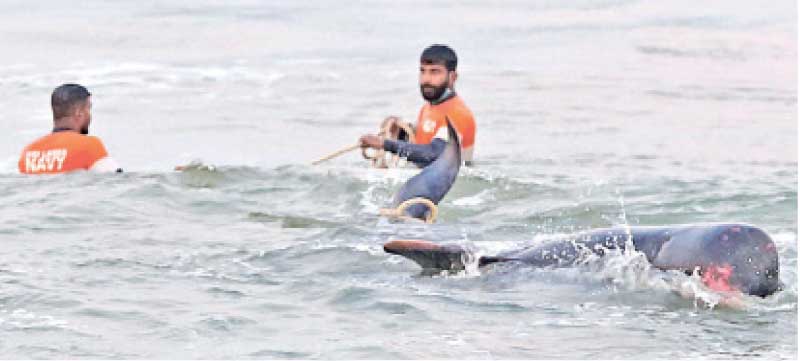Aided by only headlights of parked up vehicles along the sea shore, volunteers engaged in an overnight grueling rescue mission to send back as many as 100 pilot whales that got stranded along the Panadura sea shore.
“It was like being on a treadmill,” renowned marine biologist Dr. Asha de Vos told the Daily News yesterday. “Everytime we tried to send the whales back into deeper waters they would be washed up by waves again. It was extremely exhausting on the mammals and unfortunately two of them did not make it.” De Vos said that by her estimates there might have been around 60 to 100 pilot whales that got stranded yesterday, an occurrence which is common among these species she noted. While it was difficult to pinpoint the exact cause of the stranding, De Vos said that these mammals may have been unfamiliar with the topography and as they travel in large pods, if one of them strays the pod risks being washed up ashore.
 But carting them back to deeper waters is no easy feat, the marine biologist described adding that volunteers as well as navy and police personnel spent hours trying to keep the mammal’s blow holes unblocked while still trying to push them back. Visual imagery and video footage taken by onlookers showed some of the volunteers bringing in jet-skis in an attempt to rescue the desperate mammals.
But carting them back to deeper waters is no easy feat, the marine biologist described adding that volunteers as well as navy and police personnel spent hours trying to keep the mammal’s blow holes unblocked while still trying to push them back. Visual imagery and video footage taken by onlookers showed some of the volunteers bringing in jet-skis in an attempt to rescue the desperate mammals.
Volunteers secured the whales to the Jet Ski with the help of ropes in an attempt to haul them over the reef.
The whales were reportedly transferred to a boat that took them out into the open ocean where they were released.
Described as the largest and first massive stranding of pilot whales in Sri Lanka, de Vos said that it is important for readers to understand the science and just how gruelling it is on the mammals back recede to deeper waters. By midnight yesterday the impromptu teams of volunteers included members of Sri Lanka Army, Navy, the Coast Guard, 4x4 Club, Sri Lanka Life Saving, A-PAD guided by experts of the calibre of de Vos.
Navy spokesman Indika de Silva said that the Navy used small inshore patrol craft to pull the whales one by one back into deeper waters.”
The school of short-finned pilot whales had washed ashore at Panadura, 15 miles (25km) south of Colombo, since Monday afternoon in the biggest mass stranding of whales on the island.
The beaching of 470 pilot whales in a remote harbour in Australia’s southern island state of Tasmania was the country’s largest. About 110 of the creatures were saved in a days-long rescue effort.
Pilot whales, which can grow up to six metres (20 feet) long and weigh a tonne, are highly social. The causes of mass strandings remain unknown despite scientists studying the phenomenon for decades.Sri Lanka’s navy and volunteers have rescued 120 pilot whales stranded in the country’s worst mass beaching, but at least two injured animals were found dead, officials said.
 Sailors from the navy and the coastguard along with local volunteers had pulled back at least 120 whales by dawn on Tuesday after a gruelling overnight rescue operation, navy spokesman Indika de Silva said.
Sailors from the navy and the coastguard along with local volunteers had pulled back at least 120 whales by dawn on Tuesday after a gruelling overnight rescue operation, navy spokesman Indika de Silva said.
The school of short-finned pilot whales had washed ashore at Panadura, 15 miles (25km) south of Colombo, since Monday afternoon in the biggest mass stranding of whales on the island.
“We used our small inshore patrol craft to pull the whales one by one back into deeper waters,” De Silva told AFP. “Sadly, two whales have died of the injuries sustained when they beached.”
Local authorities were braced for mass deaths as seen in Tasmania in September when about 470 pilot whales were stranded and only about 110 could be saved after days of rescue efforts.
Sri Lanka’s Marine Environment Protection Authority (MEPA) confirmed the Panadura incident was the largest single pod of whales stranded in the south Asian country.
“It is very unusual for such a large number to reach our shores,” MEPA chief, Dharshani Lahandapura, told AFP, adding that the cause of the stranding was not known.
“We think this is similar to the mass stranding in Tasmania in September.”
Pilot whales, which can grow up to 6 metres (20 feet) long and weigh a tonne, are highly social.
The causes of mass strandings remain unknown despite scientists studying the phenomenon for decades.


